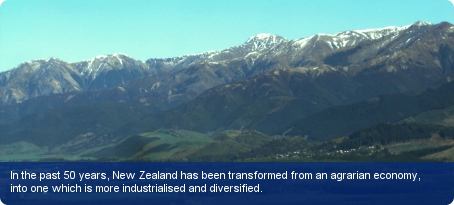Find a business in New Zealand

In the past 50 years New Zealand has been transformed from an agrarian economy largely reliant on concessionary access to the British market, into one which is more industrialised, more diversified, far less regulated and more than capable of competing successfully in the global market. It now has a GDP per capita of US$37,750 (2012) and there has been GDP growth of 0.7% per annum 2008-12. Having moved away from its dependence on sheep and butter exports, there has been significant economic growth from new agricultural products, such as kiwi fruit and wine, and the fishing and manufacturing sectors.
Manufacturing contributes around 15.5% of New Zealand’s GDP (2008). The marine industry is one of the country’s largest manufacturing sub-sectors with exported goods and services in excess of US$605 million in 2008 and forecasted exports worth close to US$1.5 billion by 2020. Food and beverage manufacturing is a major industry in New Zealand, contributing just under 5% of GDP and accounting for one-third of exports (2010).
New Zealand is a mineral rich country with a large variety of mineral deposits. The country’s mining sector is worth approximately NZ$1.5 or US$1.2 billion (2011) and is very important for other sectors of the economy such as construction and transport. Like elsewhere in the world, New Zealand’s mineral resources tend to be highly concentrated in certain areas. The country is particularly well known for its production of gold and coal. More recently there has been interest in New Zealand’s iron sands and minerals of great importance to modern economies such as rare earth elements.
Oil has been produced since the first well was drilled in Taranaki in 1966 and oil is still extracted exclusively from the Taranaki basin. As local production does not satisfy domestic demand the country imports a significant quantity of crude oil and refined petroleum products to meet its needs. New Zealand has 112.5 million barrels of proven oil reserves and 34.38 billion cubic metres of proven natural gas reserves (January 2011 estimate). Natural gas makes a substantial contribution to the country’s energy supplies, helping to provide energy security and support New Zealand’s economy. There are 16 fields and wells that produce gas in New Zealand, all in the Taranaki region.
In recent years growth has been largely driven by an increase in government and private spending. Exports picked up in 2006 after struggling for several years and are equal to about 24% of GDP, down from 33 per cent of GDP in 2001.
Approximately 66% of the 93,580 km of roads are paved and the road network on average carries 70% of the country’s internal freight and 84% of journeys to work (2010). There are four major international airports.
New Zealand is one of the most conducive countries in the world for business. It is ranked number one for starting a business and protecting investors, according to the World Bank’s ‘Doing Business 2012’ study. It is also the third best country in the world for the overall ease of doing business and second best for getting electricity. These rankings measure the conduciveness of a regulatory regime in starting and operating a business.
The country has an adult literacy rate of 99% and approximately 91% of the population to speak English as a first language (2006). A 2012 International Labour Organisation survey on New Zealand’s labour force stated that the labour force participation rate has risen to its second-highest rate ever, 68.8%.



